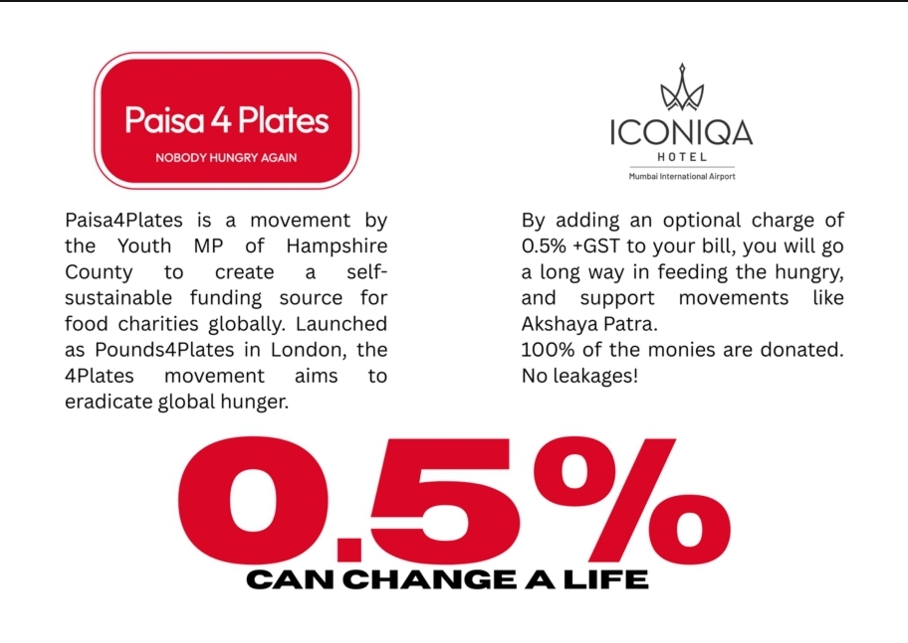Elevating Hospitality Customer Experience: How Voluntary Giving Transforms Guest Engagement
Hospitality leaders face a constant challenge: how to deliver memorable customer experiences that resonate beyond a stay. Guests expect more than clean rooms and prompt service. They crave purpose, connection, and a feeling that their choices matter. In today’s competitive landscape, Hospitality Customer Experience must evolve to meet these emotional needs while driving business results.
This article explores a groundbreaking example—the partnership between ICONIQA Mumbai and Paisa4Plates—to illustrate how voluntary giving models can foster empathy, deepen engagement, and boost brand loyalty. We’ll start with real-world CX challenges, transition to analysis and expert insights, and finish with practical takeaways for CX/EX professionals.
Real-World CX Challenge: From Transactional to Transformational
Consider a frequent business traveler, Raj, who stays at various upscale hotels across India. He values comfort and efficiency, yet after countless stays, he craves something more. He wants to feel he’s contributing to positive change. Traditional loyalty programs offer points and upgrades, but they rarely satisfy this deeper urge for purpose.
In many hotels, charitable initiatives exist, yet they often feel obligatory or poorly communicated. Guests may see a checkbox on a payment page but lack context on impact or choice. This transactional approach does little to build emotional bonds or inspire word-of-mouth praise.
As CX leaders, the challenge is clear: How can we transform giving into an integral part of the guest journey? How do we design experiences that empower customers to contribute meaningfully and feel proud of their choice?
Case Study: ICONIQA Mumbai × Paisa4Plates
In late 2025, ICONIQA Mumbai and Royal Orchid Hotels partnered with Paisa4Plates, an initiative founded by Youth MP Aryaveer Baljee, to introduce a voluntary giving model in hospitality. Inspired by London’s Pounds4Plates, the program enables guests to add 0.5% of their bill to local charities addressing homelessness and child nutrition.
Key Highlights:
- Guests at ICONIQA and 120+ Royal Orchid properties can opt in via clear table tents and digital messaging.
- Contributions support mid-day meals for schoolchildren, feeding homeless communities, and local food banks.
- Hotel teams collaborate with NGOs to ensure transparency and share impact stories post-stay.
This initiative reframes giving as a guest-driven choice. It integrates seamlessly into the guest journey, inviting meaningful participation without pressure.
In-Depth Analysis: Why Voluntary Giving Drives CX Success
1. Emotional Engagement Fuels Loyalty
Purpose strengthens emotional bonds. When guests choose to give, they shift from passive consumers to active co-creators of social impact. This amplifies satisfaction and boosts the likelihood of repeat stays.
2. Transparency Builds Trust
Clear communication about where funds go and the outcomes achieved reinforces trust. ICONIQA provides post-stay impact reports, showcasing meals delivered and communities served. This transparency fosters credibility and authentic connection.
3. Personalization Meets Modern Expectations
Today’s travelers seek experiences aligned with their values. A voluntary giving option caters to individual preferences—whether supporting children’s nutrition or aiding those without homeless. Catering to diverse causes increases relevance and appeal.
4. Operational Simplicity Ensures Scalability
Integrating a small service-charge option into existing billing systems requires minimal technical overhead. Royal Orchid’s IT team rolled out the feature across its property management system within weeks, proving that impact initiatives need not be operational burdens.
Expert Commentary
Shibani Malhotra, General Manager, ICONIQA Mumbai:
“Empathy is at the heart of hospitality. By offering guests a simple way to give back, we align our service excellence with social responsibility.”
Aryaveer Baljee, Founder of Paisa4Plates:
“Hospitality has the power to uplift communities. This model empowers guests to be part of the solution while enjoying world-class experiences.”
Actionable Insights for CX/EX Professionals
Implementing a voluntary giving model requires thoughtful design and cross-functional collaboration. The following steps outline a roadmap:
1. Identify Relevant Causes
Engage with local NGOs to pinpoint pressing community needs. Align causes with your brand’s values and guest demographics.
2. Seamlessly Integrate into Guest Journey
Use multiple touchpoints—table tents, in-room tablets, mobile apps—to introduce the giving option. Emphasize choice and impact without interrupting core service flows.
3. Leverage Data for Transparency
Track contributions and measure outcomes (e.g., meals served, households aided). Share real-time dashboards with guests via email or post-stay reports.
4. Train Frontline Teams
Empower staff to explain the initiative enthusiastically and answer guest questions. Frontline engagement drives adoption and fosters genuine conversations.
5. Promote Through Storytelling
Craft compelling content—videos, guest testimonials, hotel newsletters—to showcase real stories of impact. Storytelling humanizes the initiative and encourages participation.
6. Monitor and Iterate
Collect guest feedback on the program’s clarity, ease of use, and emotional resonance. Use insights to refine messaging, adjust contribution options, or expand cause offerings.

Broader Implications for Employee Experience
A strong guest-led giving initiative can also enhance employee experience (EX). Involve staff in charity selection, impact tracking, and storytelling. This participation bolsters morale, strengthens team purpose, and reduces turnover. In turn, engaged employees deliver more empathetic service, closing the CX-EX loop.
Conclusion: Practical Takeaways
Hospitality Customer Experience must evolve toward purpose-driven engagement. The ICONIQA–Paisa4Plates case shows that a voluntary giving model can:
- Deepen emotional guest bonds
- Enhance brand trust through transparency
- Scale easily with existing systems
- Drive positive employee engagement
By identifying causes, integrating options seamlessly, and communicating impact clearly, CX leaders can transform routine stays into meaningful experiences. Ultimately, empowering guests to give reshapes hospitality from transactional to transformational — delivering both social impact and sustainable loyalty.

